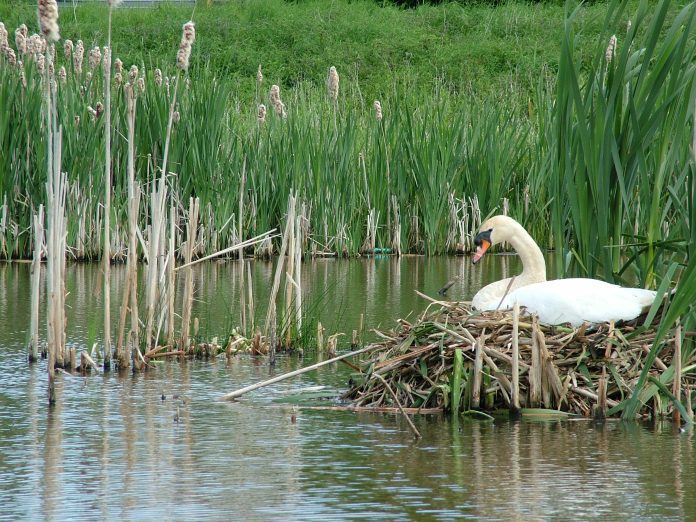Every year our Rangers drain the large pond at Stryt Las Park in Johnstown.
They do this to give the lake bed a good clean and remove the fish which are netted by Natural Resources Wales and relocated to another pond or a lake that needs stocking. the fish are removed to prevent them from eating the the rare and protected Great Crested Newts that live on the site.
Litter in the lake is unsightly and often dangerous to the many birds that live on the lake at Stryt Las. Traffic signs, bikes, thousands of cans and bottles and the ever present shopping trolleys have all been removed from the mud in previous years.
The ducks and swans that live on the lake at Stryt Las are free to fly to other ponds, as they often do, returning at a later date.
This year will also see the removal of an infestation of the invasive species Crassula helmsii by Wild Ground, who manage the northern half of the park. Wild Ground are a North Wales based conservation charity, who own and manage nature reserves across North Wales.
Crassula helmsii or New Zealand pigmyweed (Australian swamp-stonecrop) can spread quickly and destroy life in ponds and lakes.
Stryt Las is a Site of Special Scientific Interest
Cllr David A Bithell, Lead Member for Environment and Transport, said: “Stryt Las is a designated Special Area of Conservation and a Site of Special Scientific Interest and we are very fortunate to have such an area on our doorstep. The rangers do a great job looking after the area and regular visitors to the park will be used to this annual clean up.”
Paul Furnborough, Reserves Development Manager, Wild Ground, said: “This is a very invasive plant which is already smothering our biggest pond, and if not controlled it will spread throughout the SSSI/SAC. It is incredibly pernicious and hard to kill, so we will take the extreme measure of covering the entire pond in a black liner to block out sunlight. Fortunately it does not survive well in the seedbed, so when we remove the cover the pond should spring back to life without it.
“These problems often arise when well-meaning people see an apparently empty pond and move plants or animals from other-sites, but unfortunately this can spread both invasive species and diseases, so we will also be installing information boards and updating our website with information about how best to look after local ponds for wildlife.
“This sort of large-scale conservation work is both expensive and difficult, and couldn’t be achieved without practical support from the Wrexham Council Ranger team or funding from Welsh Government and the National Lottery Heritage Fund through the Local Places for Nature scheme, or the goodwill and pride of residents in their local wild spaces.”
???? Get the facts…read the latest NHS Wales Covid-19 vaccination info ????
[button color=”” size=”large” type=”square_outlined” target=”new” link=”https://phw.nhs.wales/topics/immunisation-and-vaccines/covid-19-vaccination-information/”]GET THE FACTS[/button]









